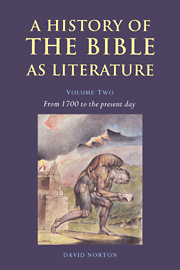Book contents
- Frontmatter
- Contents
- List of abbreviations
- 1 The early eighteenth century and the KJB
- 2 Mid-century
- 3 The critical rise of the KJB
- 4 Romantics and the Bible
- 5 Literary discussion to mid-Victorian times
- 6 The Revised Version
- 7 ‘The Bible as literature’
- 8 The later reputation of the KJB
- 9 Narrative and unity: modern preoccupations
- 10 This (spiritual) treasure in earthen/earthenware/clay vessels/pots/jars
- Appendix
- Bibliography
- General index
- Biblical index
- Frontmatter
- Contents
- List of abbreviations
- 1 The early eighteenth century and the KJB
- 2 Mid-century
- 3 The critical rise of the KJB
- 4 Romantics and the Bible
- 5 Literary discussion to mid-Victorian times
- 6 The Revised Version
- 7 ‘The Bible as literature’
- 8 The later reputation of the KJB
- 9 Narrative and unity: modern preoccupations
- 10 This (spiritual) treasure in earthen/earthenware/clay vessels/pots/jars
- Appendix
- Bibliography
- General index
- Biblical index
Summary
Religion and literature kept apart
The idea of the Bible as a literary work became so strong in the latter half of the eighteenth century that there is a danger of forgetting that, as in all periods, there were many who kept religion and literature separate. Some did so for the familiar reason that literature was inseparable from vice; others admired literature but shied away from religion: for them the Bible was obviously associated with religion and so they ignored it as literature. There is abundant testimony to the endurance of this latter prejudice. To take but one example from the period we are entering on, the novelist and cleric Laurence Sterne believed that the 1760s was a ‘licentious age … bent upon bringing Christianity into discredit’ (IV: 420). He states baldly that ‘men of taste and delicacy … turn over those awful sacred pages with inattention and an unbecoming indifference … so far has negligence and prepossession stopped their ears against the voice of the charmer’ (IV: 413). Where Richardson had believed that a rake like Belford might be freed from this negligence by chancing on a work like Blackwall's, another remedy occurred to some in the latter part of the century, that the Bible — or parts of it — might be appreciated as literature by these men if it could somehow be separated from its religious context.
- Type
- Chapter
- Information
- A History of the Bible as Literature , pp. 53 - 93Publisher: Cambridge University PressPrint publication year: 1993



